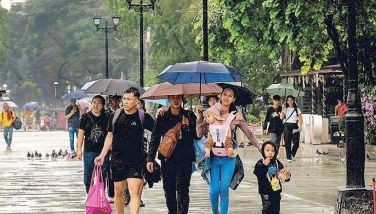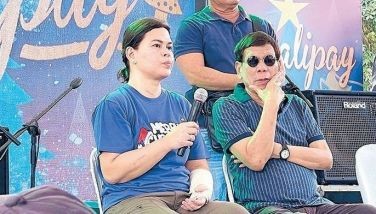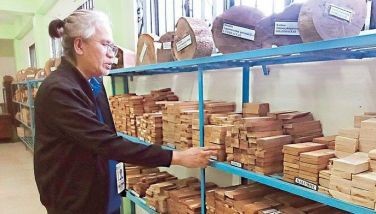Artist record book delay to cost P192-M loss
January 25, 2003 | 12:00am
For its failure to issue artist record books (ARB) to about 20,000 prospective overseas performing artists last year, the Technical Education and Skills Development Authority (TESDA) is now in the hot seat.
At least 50 Filipina entertainers are now readying a class suit against TESDA director general Dante Liban, whom they accused of deliberately delaying the issuance of ARBs.
Without the certification, a Filipino artist cannot work in countries like Japan, Korea and Taiwan, which are requiring the document prior to the issuance of a visa.
Even TESDA testing officers and testing venue owners are also calling on President Arroyo to immediately replace Liban. At a press conference yesterday, the group said Mrs. Arroyo should ask Liban to step down or replace him with a new director general.
Lorenzo Langomez, Philippine Association of Recruitment Agencies Deploying Artists (PARADA) president, said thousands of Filipina entertainers lost the opportunity of earning $800 a month, or some P192 million in possible earnings for the industry, because of TESDA’s backlog in ARB issuance.
Records from the Philippine Overseas Employment Administration (POEA) confirm that deployment of Filipino entertainers to Japan went down to 50,000 last year from 70,000 in 2001.
Langomez said that there was already a backlog even before Liban assumed post in June 2002 but the situation has worsened since he required entertainers who already passed the testing to undergo re-assessment.
"The rules did not improve the credibility of the system but aggravated the ARB backlog and it also brought about graft as passers and rehired overseas performing artists were constrained to cough up grease money to facilitate the release of ARB," Langomez disclosed.
TESDA charges only P300 for the ARB. However, Langomez revealed that PARADA received information that it is now being sold to prospective entertainers who do not want to undergo testing at P25,000 each.
Earlier, Rep. Imee Marcos (KBL, Ilocos Norte), filed a resolution urging the House of Representatives to investigate the controversies in TESDA. She wanted the probe to focus on the alleged rampant sale of ARBs to unqualified performers for as much as P50,000 per book.
Liban, however, said that the sale of ARBs began before his time and this illegal practice is precisely the one he has been fighting since he became TESDA chief last year.
He explained that those behind this irregularity lost billions of pesos in possible earnings after he made the process for obtaining ARBs more strict.
"We don’t want to send unqualified entertainers abroad, that’s why we made the testing and evaluation process more strict. The syndicates felt the effect. Natamaan sila (It affected their earnings)," he added.
Liban said that syndicates in TESDA are composed of promoters, talent managers, and even TESDA officials themselves who used to earn hundreds of millions a year from Filipino entertainers.
"The Philippines deploys more than 50,000 entertainers abroad every year. If you earn a minimum of P10,000 from each of these entertainers, then you earn P500 million. Malaki talaga ang kita kaya galit na galit sila sa akin nung naghigpit ako. (They really earn so much, that’s why they are so mad at me when I made the process strict.)"
At least 50 Filipina entertainers are now readying a class suit against TESDA director general Dante Liban, whom they accused of deliberately delaying the issuance of ARBs.
Without the certification, a Filipino artist cannot work in countries like Japan, Korea and Taiwan, which are requiring the document prior to the issuance of a visa.
Even TESDA testing officers and testing venue owners are also calling on President Arroyo to immediately replace Liban. At a press conference yesterday, the group said Mrs. Arroyo should ask Liban to step down or replace him with a new director general.
Lorenzo Langomez, Philippine Association of Recruitment Agencies Deploying Artists (PARADA) president, said thousands of Filipina entertainers lost the opportunity of earning $800 a month, or some P192 million in possible earnings for the industry, because of TESDA’s backlog in ARB issuance.
Records from the Philippine Overseas Employment Administration (POEA) confirm that deployment of Filipino entertainers to Japan went down to 50,000 last year from 70,000 in 2001.
Langomez said that there was already a backlog even before Liban assumed post in June 2002 but the situation has worsened since he required entertainers who already passed the testing to undergo re-assessment.
"The rules did not improve the credibility of the system but aggravated the ARB backlog and it also brought about graft as passers and rehired overseas performing artists were constrained to cough up grease money to facilitate the release of ARB," Langomez disclosed.
TESDA charges only P300 for the ARB. However, Langomez revealed that PARADA received information that it is now being sold to prospective entertainers who do not want to undergo testing at P25,000 each.
Earlier, Rep. Imee Marcos (KBL, Ilocos Norte), filed a resolution urging the House of Representatives to investigate the controversies in TESDA. She wanted the probe to focus on the alleged rampant sale of ARBs to unqualified performers for as much as P50,000 per book.
Liban, however, said that the sale of ARBs began before his time and this illegal practice is precisely the one he has been fighting since he became TESDA chief last year.
He explained that those behind this irregularity lost billions of pesos in possible earnings after he made the process for obtaining ARBs more strict.
"We don’t want to send unqualified entertainers abroad, that’s why we made the testing and evaluation process more strict. The syndicates felt the effect. Natamaan sila (It affected their earnings)," he added.
Liban said that syndicates in TESDA are composed of promoters, talent managers, and even TESDA officials themselves who used to earn hundreds of millions a year from Filipino entertainers.
"The Philippines deploys more than 50,000 entertainers abroad every year. If you earn a minimum of P10,000 from each of these entertainers, then you earn P500 million. Malaki talaga ang kita kaya galit na galit sila sa akin nung naghigpit ako. (They really earn so much, that’s why they are so mad at me when I made the process strict.)"
BrandSpace Articles
<
>
- Latest
- Trending
Trending
Latest
Trending
Latest
Recommended






























